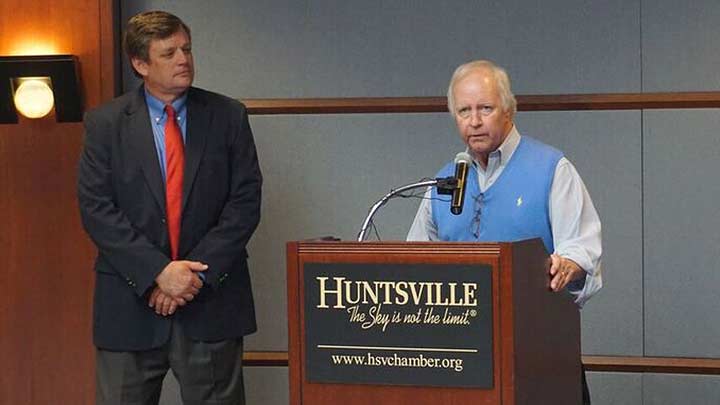
Huntsville-Madison County Chamber of Commerce CEO Chip Cherry and UAH President Robert Altenkirch sign a memorandum of agreement to collaborate on economic development projects, boosting regional entrepreneurs and incubating business start-ups.
Ray Garner | UAH
Economic development, boosting regional entrepreneurs and incubating business start-ups are among the goals of a new partnership forged between The University of Alabama in Huntsville (UAH) and the Chamber of Commerce of Huntsville/Madison County.
Representatives of both signed a Memorandum of Agreement (MOA) today in which they join together to work toward building and nurturing a collaborative environment in which professionals, entrepreneurs and businesses can thrive.
Both organizations have strong ties to economic development in the region,
said UAH President Robert Altenkirch. We historically have worked in partnership to foster, attract and develop new businesses to continue to drive the economic and technological success story that is Huntsville and Madison County. This agreement strengthens our partnership with the Chamber of Commerce in these development efforts, which have produced results for our region in the past and will continue to do so in the future.
The agreement states that UAH will leverage university entrepreneurial initiatives into economic engines in local communities, support the chamber’s business recruitment activities, and identify and coordinate ways in which UAH can help produce a competitive economic development portfolio.
A strong partnership between the business community and UAH has been and continues to be a vital part of the growth and development of our region’s economy. The agreement between the Chamber and UAH is an articulation of the collaborative relationship that has existed for many years,
said Chip Cherry, president and CEO of the Chamber of Commerce of Huntsville/Madison County. We will continue to support the efforts of UAH as it expands its entrepreneurial and business start-up initiatives, as well as their expanding focus on research, development and other factors to produce a competitive workforce which feed the economy of our region. We are happy to partner with UAH on this MOA and look forward to further collaboration.
Additionally, UAH will support the chamber in the pursuit of financial support from local, state and federal agencies and support efforts to actively market Cummings Research Park, Huntsville/Madison County and the region as a prime business destination.
The Chamber agrees to facilitate entrepreneurial and business start-up development initiatives in partnership with UAH and the community, and to partner with UAH in business recruitment activities resulting from UAH research and academic excellence.
The Chamber will also identify and coordinate a community response to critical factors necessary to produce a competitive economic development portfolio, pursue financial support and incentives at the federal, state and local levels to facilitate the growth and capabilities of UAH and actively market the university as a capability in Chamber publications.
The agreement comes as UAH moves forward on an Innovation to Invention Center (I2C) that will house up to 40 startup businesses and provide them with office and laboratory space. Construction of the 45,000-square-foot building is expected to begin in about a year and it should be completed in an additional two years.
The incubator will use university resources at UAH to bring technologies into the marketplace through identification and funding of entrepreneurs in a 15-county region and at UAH, and will provide a range of services to convert ideas, research and prototypes into viable commercial products. Startup companies that result will reside at the incubator for about three to five years before launching on their own.
The end result is expected to be a company- and jobs-creation engine that will also include room for anchor tenants. It will be designed to facilitate interplay between campus academics and researchers and business executives to “mine” so-called throwaway technologies that have been discovered yet shelved. These technologies will be assessed and then developed to be commercially viable through startup companies.